

DPA - The Principles. Court confirms that IP addresses are personal data in some cases. White & Case Technology Newsflash The Court of Justice of the European Union has held that IP addresses are "personal data" in certain circumstances.
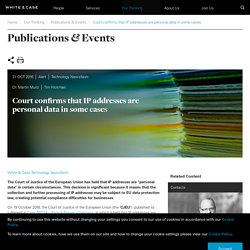
This decision is significant because it means that the collection and further processing of IP addresses may be subject to EU data protection law, creating potential compliance difficulties for businesses. DPA - Individual Rights. GDPR Penalties and Fines. GDPR penalties and fines The GDPR (General Data Protection Regulation) sets a maximum fine of €20 million (about £18 million) or 4% of annual global turnover – whichever is greater – for infringements.
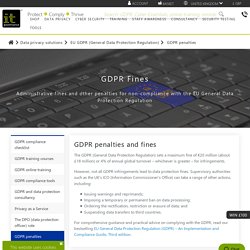
However, not all GDPR infringements lead to data protection fines. ICO - Home. What is the Computer Misuse Act? With the rise of personal computing devices in the 1980s and their increased prominence in businesses, lawmakers drafted fresh rules that aimed to protect the information increasingly on these machines.
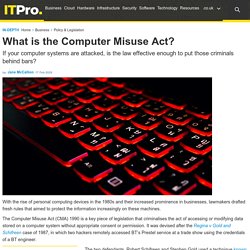
The Computer Misuse Act (CMA) 1990 is a key piece of legislation that criminalises the act of accessing or modifying data stored on a computer system without appropriate consent or permission. It was devised after the Regina v Gold and Schifreen case of 1987, in which two hackers remotely accessed BT’s Prestel service at a trade show using the credentials of a BT engineer. The two defendants, Robert Schifreen and Stephen Gold used a technique known as shoulder surfing to ascertain these credentials, and eventually hunted down the email account of the Duke of Edinburgh, Prince Philip, once they had infiltrated the Prestel system. BT had noticed odd behaviour on the account they were using, and began monitoring this activity, before passing their intelligence to the police. Download now. MyGlasgow - IT Services - Policy and strategy - Computer Misuse Act (1990) Computer misuse act (1990) Computer Misuse Act (1990) creates three criminal offences This makes it illegal to access a computing system unless authorised to do so.
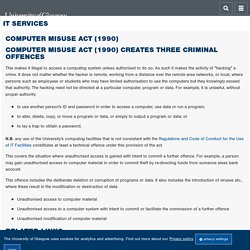
As such it makes the activity of "hacking" a crime. It does not matter whether the hacker is remote, working from a distance over the remote area networks, or local, where persons such as employees or students who may have limited authorisation to use the computers but they knowingly exceed that authority. The hacking need not be directed at a particular computer, program or data.
To use another person's ID and password in order to access a computer, use data or run a program;to alter, delete, copy, or move a program or data, or simply to output a program or data; orto lay a trap to obtain a password. Computer Misuse Act - Example Cases (Prosecuted) Copyright Law Basics For UK Software Developers. About The Author Kimberly Bond is an intellectual property attorney and writer with over a decade of experience.
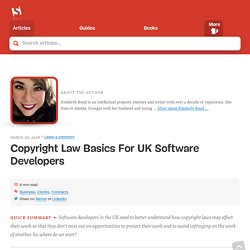
She lives in Atlanta, Georgia with her husband and young … More about Kimberly Bond … Software developers in the UK need to better understand how copyright laws may affect their work so that they don’t miss out on opportunities to protect their work and to avoid infringing on the work of another. So, where do we start?
Software developers all over the world can benefit from an increased understanding of intellectual property (IP) laws and how those laws may affect their work. The purpose of this article is to provide information about one type of IP law, copyright law, for software developers who live or work in the United Kingdom. Copyright Law Essentials You can learn more about copyright law in general and about how it applies to software in my previous article. UK Copyright Service - UK and International Copyright Registration Centre.
Software Copyright. Copyright Infringement Examples. Lawsuits often stem from copyright infringement, plagiarism, or inaccurate details surrounding true events.
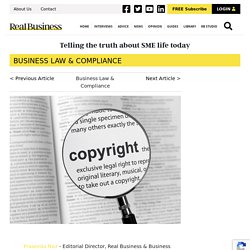
In some cases, a lawsuit is wrapped up quickly, but there are several famous copyright cases where infringements led to legal action. Some of the biggest copyright infringement cases have been between some of the most well-known companies in the world, including the copyright court cases listed below. This article was originally published on 11 August 2014. Related: What is considered fair dealing in UK copyright law? 1. Perhaps the most famous case of copyright infringement is that of Battlestar Galactica, who apparently ‘borrowed’ a little too much from Star Wars. Lucas loses Star Wars copyright case at Supreme Court. A prop designer who made the original Stormtrooper helmets for Star Wars has won his copyright battle with director George Lucas over his right to sell replicas.
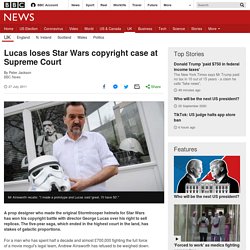
The five-year saga, which ended in the highest court in the land, has stakes of galactic proportions. For a man who has spent half a decade and almost £700,000 fighting the full force of a movie mogul's legal team, Andrew Ainsworth has refused to be weighed down. He has had bailiffs at his door demanding $20m (£12m) and has defended the onslaught in the High Court, Court of Appeal and Supreme Court - not to mention the US.
But like the iconic characters he helped create as a 27-year-old art school graduate - and which still surround him in the same modest workshop 35 years later - he has become battle hardened. "You've got to decide right at the start, can you afford the downside? " Media playback is unsupported on your device 'Pandora's box' "The phone didn't stop ringing... Intellectual Property Office. Consumer Rights Act 2015 - Which? Consumer Rights. Indg36. Working safely with display screen equipment: Overview - HSE.
As an employer, you must protect your workers from the health risks of working with display screen equipment (DSE), such as PCs, laptops, tablets and smartphones.
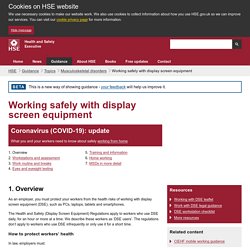
The Health and Safety (Display Screen Equipment) Regulations apply to workers who use DSE daily, for an hour or more at a time. We describe these workers as ‘DSE users’. The regulations don’t apply to workers who use DSE infrequently or only use it for a short time. How to protect workers’ health In law, employers must: Incorrect use of DSE or poorly designed workstations or work environments can lead to pain in necks, shoulders, backs, arms, wrists and hands as well as fatigue and eye strain. The law applies if users are, for example: Weee disposal guidance for business. Electrical waste: retailer and distributor responsibilities. Waste Electrical and Electronic Equipment (WEEE) The WEEE regulations aim to reduce the environmental impacts caused by end-of life electronic and electrical items.
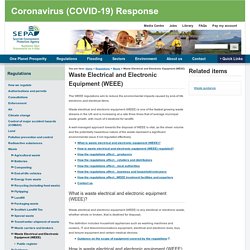
Regulations: waste electrical and electronic equipment (WEEE) Overview.

Equality Act 2010: guidance. Overview The Equality Act 2010 legally protects people from discrimination in the workplace and in wider society. It replaced previous anti-discrimination laws with a single Act, making the law easier to understand and strengthening protection in some situations. It sets out the different ways in which it’s unlawful to treat someone. Find out more about who is protected from discrimination, the types of discrimination under the law and what action you can take if you feel you’ve been unfairly discriminated against.